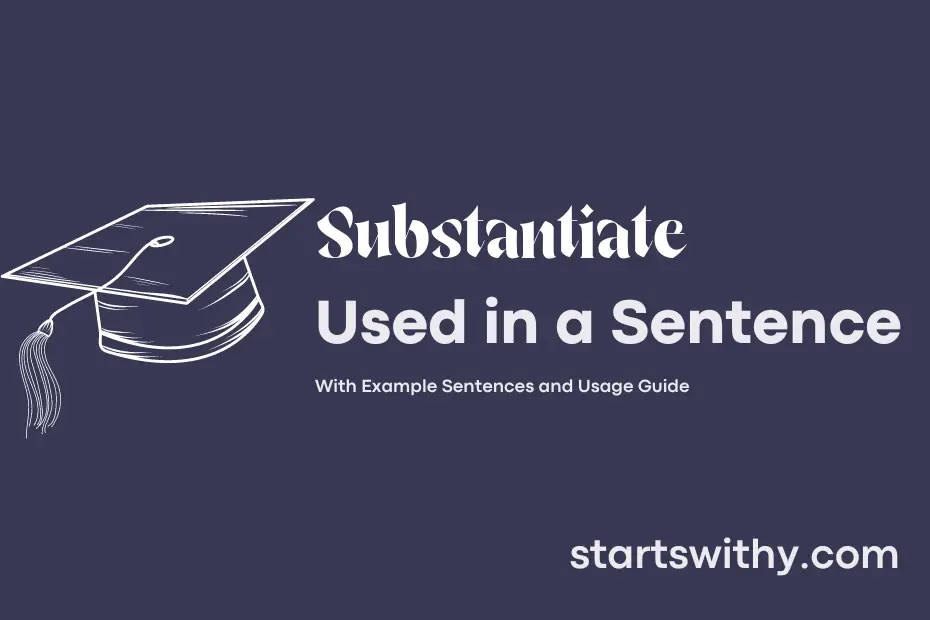Have you ever struggled to back up your arguments with solid evidence? In other words, to substantiate a claim means to provide proof or support for it with credible information. This process involves presenting facts, data, or experiences that validate your statement and make it more convincing to others.
Substantiating your claims in conversations, essays, or debates is key to building credibility and persuading your audience. By offering concrete examples, statistics, or expert opinions, you can effectively bolster your argument and leave a lasting impact on your listeners or readers.
7 Examples Of Substantiate Used In a Sentence For Kids
- Can you substantiate your claim with evidence?
- The teacher asked us to substantiate our answers with examples.
- You need to substantiate your argument with facts.
- It is important to substantiate your opinions with reasons.
- Can you substantiate your story with details?
- Remember to substantiate your ideas with information.
- Try to substantiate your thoughts with explanations.
14 Sentences with Substantiate Examples
- Substantiate your claims with references and evidence in your research paper.
- Make sure to substantiate your answers with relevant examples during your oral presentation.
- It is essential to substantiate your arguments with factual data in your academic essay.
- The professor requested that the students substantiate their findings with reliable sources.
- Substantiate your project proposal with a well-researched literature review.
- It is important to substantiate your conclusions with logical reasoning in your academic debates.
- The panel of judges will expect you to substantiate your project’s efficiency during the presentation.
- Make sure to substantiate your theories with experimental data in your scientific report.
- The exam requires students to substantiate their answers with proper explanations.
- Substantiate your argument by drawing connections between different concepts in your paper.
- The teacher emphasized the need to substantiate your opinions with sound reasoning.
- The committee will evaluate your research based on how well you substantiate your hypotheses.
- The research paper lacks credibility because it fails to substantiate its claims with supporting evidence.
- It is crucial for students to substantiate their viewpoints with relevant information in academic discussions.
How To Use Substantiate in Sentences?
Substantiate means to provide evidence or support for something. When using this word in a sentence, it’s important to clearly show how you are proving or supporting your claim.
Here’s a simple guide on using substantiate effectively in a sentence:
- Identify the claim you want to support or prove.
- Find evidence, examples, or facts that back up your claim.
- Use substantiate in your sentence to indicate that you are providing this evidence.
For example, instead of saying “I think the new marketing strategy will be successful,” you can say “I believe the new marketing strategy will be successful, and I can substantiate this by pointing to the increase in website traffic and customer engagement since its implementation.”
Remember to be specific and detailed when using substantiate to ensure that your evidence is clear and convincing. Avoid making vague statements without providing concrete examples.
In summary, to use substantiate in a sentence, state your claim, provide evidence to support it, and use the word effectively to show that you are backing up your argument with facts or examples.
Conclusion
In summary, the examples of sentences with “substantiate” demonstrate how this word is used to show evidence or support for a claim or statement. By providing concrete proof or validation, these sentences showcase the importance of substantiating arguments with reliable facts or data. Whether in academic writing, legal documents, or everyday conversations, the use of “substantiate” emphasizes the need for credibility and accuracy in making assertions.
In conclusion, the word “substantiate” plays a crucial role in strengthening arguments and lending credibility to statements by providing solid evidence. By substantiating claims, individuals can build trust, credibility, and persuasiveness in their communication, ultimately enhancing the clarity and effectiveness of their messages.



